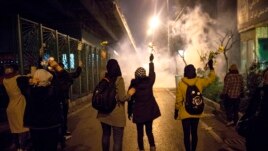13 January 2020
Mass street protests continue in Iran over the accidental shootdown of a Ukrainian passenger airplane.
Iranians expressed shock and anger over the plane crash. They also denounced the misleading statements from Iranian leaders. Officials only admitted responsibility after growing evidence from Western nations.

In this photograph taken Saturday, Jan. 11, 2020, protesters hold flowers as tear gas fired by police rises at a demonstration in front of Amir Kabir University in Tehran, Iran, to remember victims of a Ukrainian airplane shot down by an Iranian missile.
The country began last week mourning the death of General Qassem Soleimani. He was killed in a U.S. drone strike on January 2 in Iraq.
On January 8, Iran answered with a missile attack on two bases housing U.S. troops in Iraq. There were no reported deaths from those attacks.
Hours later, as the country prepared for a possible U.S. counterattack, Iranian forces accidentally shot down Ukrainian International Airlines Flight 752, killing all 176 people on board. The plane was on its way to Kyiv, Ukraine. It had just taken off from Tehran's main airport.
Most of those who died were Iranians or Iranian-Canadians.
Misleading the public
Iranian officials first blamed technical failure for the crash. They denounced Canadian and U.S. officials who said evidence pointed to the accidental downing of the plane by an Iranian missile.
Three days later, Iran's Revolutionary Guard admitted to shooting down the plane by mistake. Soon after, a memorial for the victims at a university in Iran quickly turned into an anti-government demonstration.
For a growing number of Iranians, the events showed a government unable to follow through on its threatening language. It also showed a government willing to mislead its own people about a national tragedy in order to avoid embarrassment.
"They are lying that our enemy is America! Our enemy is right here," students at the protest shouted.
Protests in Freedom Square
On Sunday night, protesters gathered in Tehran's Azadi Square, or Freedom Square.
Videos sent to the New York-based Center for Human Rights in Iran and later confirmed as real by The Associated Press show a crowd of demonstrators near Azadi Square. They are seen fleeing as a tear gas container lands among them.
As they try to escape the fumes, one woman calls out in Farsi, "They fired tear gas at people! Azadi Square! Death to the dictator!"
Another video shows a female protester being carried away following violence. Drops of blood can be seen on the ground. Those around her cry out that she has been shot in the leg.
Tehran's police chief, General Hossein Rahimi, later denied that his officers opened fire. The Fars news agency reported that police had "shot tear gas in some areas."
Fars, which is close to the Revolutionary Guard, aired videos apparently filmed Sunday night showing demonstrators shouting: "We are children of war. Fight with us, we will fight back." Another Fars video showed demonstrators in Tehran tearing down a poster of Soleimani.
U.S. support?
U.S. President Donald Trump has openly supported the demonstrators. He tweeted messages in the Farsi language and warned the government not to fire on them.
But earlier, larger waves of protests in the country have been crushed by security forces. Amnesty International says more than 300 people were killed in November during days of protests against an increase in gasoline prices.
Ali Rabiei, a government spokesman, said Iran's civilian officials learned only on Friday that the Revolutionary Guard had shot down the plane. "The point is that we did not lie," Rabiei said. He also blamed the U.S. for "spreading the shadow of war over Iran."
Ebrahim Raisi, the head of Iran's judiciary, issued a warning to protesters. He said "the agents of America and agents of foreign countries" want to use anger over Flight 752 to "compromise" Iran's security.
In addition to the street protests, Iran's government has also faced strong criticism from well-known artists, sports stars and reporters.
A number of artists, including famed director Masoud Kimiai, withdrew from an upcoming international film festival. Two state television hosts resigned in protest over the false reporting about what happened to Flight 752.
Taraneh Alidoosti, one of Iran's most famous actresses, published a picture of a black square on Instagram. She wrote: "We are not citizens. We are hostages. Millions of hostages."
I'm Ashley Thompson.
The Associated Press reported this story. Ashley Thompson adapted it for VOA Learning English. Hai Do was the editor.
_____________________________________________________________
Words in This Story
drone - n. a type of small aircraft that flies without a pilot
counterattack - n. an attack that is made in response to an attack by an enemy or opponent
embarrassment - n. something or someone that causes a person or group to look or feel foolish
fumes - n. smoke or gas that smells unpleasant
host - n. a person who talks to guests on a television or radio show
shadow - n. a dark shape that appears on a surface when someone or something moves between the surface and a source of light
festival - n. a special time or event when people gather to celebrate something